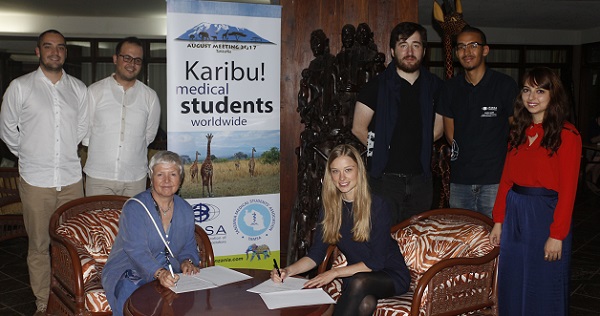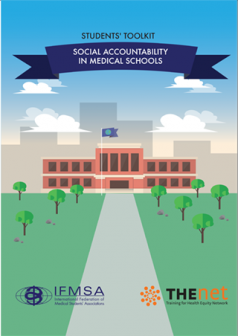Policy Bite: Toolkit for Social Accountability in Medical Schools
 Amanda Howe writes about the ‘Students’ Toolkit for Social Accountability in Medical Schools’. Photo (above) Amanda signing the MOU with The International Federation of Medical Students’ Associations (IFMSA) representative, Marie Hauerslev, in Tanzania, in 2017.
Amanda Howe writes about the ‘Students’ Toolkit for Social Accountability in Medical Schools’. Photo (above) Amanda signing the MOU with The International Federation of Medical Students’ Associations (IFMSA) representative, Marie Hauerslev, in Tanzania, in 2017.
español
The International Federation of Medical Students’ Associations (IFMSA) and the Training for Health Equity Network (‘THEnet’) have recently published an important ‘Students’ Toolkit for Social Accountability in Medical Schools’.
Toolkit
WONCA has Memoranda of Understanding with both of these organisations, and the President was invited to comment on earlier versions, as well as hearing relevant conference presentations when she was invited to the TUFH conference in April and the IFMSA meeting in Tanzania in August. It is a brief document – only 18 pages with definitions, questions to ask, and explanations of the ways to score and use the results. It is actually written for medical students, to raise their awareness of the definitions of social accountability, and to encourage them to champion this cause, and to request curriculum reform, if needed. I am using it for the first 2018 policy bite because I think the ideals expressed are important for us all to reflect on.
The principles of social accountability are of equity, quality, relevance, partnership, and efficiency – echoing the frequently cited plea for care that is based on continuing relationships, accessible, affordable, acceptable, and effective.
Referencing this principle to providers of health care or of clinical education means that we turn the lens on ourselves and ask – for example – “what is medical education actually for?” Some might answer –to get a high status job which is intellectually stimulating and has good earning power. Others would give the answer cited in this publication – “Medical education does not exist to provide students with a way of making a living, but to ensure the health of the community”.

Questions to ask include:
- Do we have an explicit mission statement which drives us to consider the needs of our communities on a consistent basis?
- To what extent are we able to show that our service / training addresses the needs of the population?
- Do we have real partnerships with the users of our services that actually uses their input to shape our work?
- Do those learning with us get positive exposure to all parts of the community, so that their understanding of patient diversity and community context is deepened and strengthened?
As family doctors, we have an important role to play in supporting the move towards delivering training for health professionals that improves social accountability.
By offering placement opportunities in community settings for medical, nursing, pharmacy and other health professionals, we allow learners to come close to the people – in their own homes and communities, in a better state of health than when in hospital, and with an immediate opportunity to understand how different backgrounds can influence health and health systems. We can show them the challenges and excitements of working to try to improve the health of the community through projects that address recurring health problems and try to work ‘upstream’ of the individuals who consult with us.
For example, Prof Jan de Maeseneer, in his keynote at the WONCA Europe 2015 conference, referred to the longstanding principle of community oriented primary care which he had established in his practice in Belgium - an ethnically diverse and relatively poor community where the practice developed an active patient and stakeholder meeting on a regular basis to guide and reform services, and where, over the years, projects delivered improvements such as road traffic accident prevention, better nutrition, and ‘dental fitness’ from childhood.
Another reason to become family doctor educators and show students the value of our work is, of course, to assist in recruitment to our discipline.
One of the questions in the IFMSA/THEnet Toolkit is “Are you required to do community based learning (opposed to only elective opportunities)?”, reflecting the stark reality that many students still complete a medical training with no real experience of settings outside the university or hospitals – which makes any genuine understanding of population health and primary care unlikely.
So, the Toolkit should also inspire WONCA members to assess their own local medical schools using the same instrument, and to challenge areas where we feel that the courses lack a genuine sense of social responsiveness. We can address these issues via our member organisations, academic members, and through the work of our own WONCA Working Party on Education, as well as at individual clinic level. The weblink provides access to a useful set of teaching tools and draft documents which can be adapted as needed.
In conclusion – congratulations to the IFMSA and THEnet for this useful and inspiring work.
Discussions between WONCA and IFMSA at WHO meetings and in conferences are now leading to more regular contact between our Young Doctors Movements and the IFMSA, also with the Education and Rural Working Parties, and students are welcome to join the YDM email lists. We look forward to making further contributions to the rollout of the SA Toolkit and to the general improvement in undergraduate education. Happy New Year!